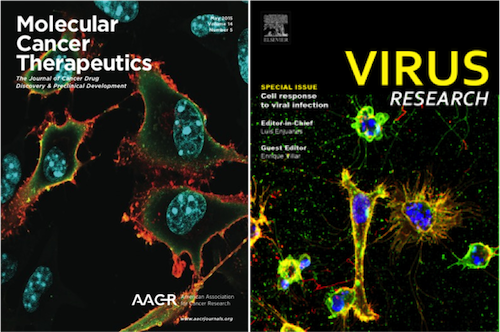Research Assistant Professor
sara.cuadrado@mssm.edu
Research Interests
My research is focused on the enhancement of the oncolytic capacity of Newcastle disease virus (NDV), considered nowadays one of the most promising viral vectors for cancer treatment. Using reverse genetics technology, we are able to generate new recombinant NDVs capable of inducing better and more specific therapeutic responses in different in vivo murine tumor models. The development of new armed NDVs provides us with an extraordinary tool to target programmed cell death, create innate and adaptive anti-tumor responses and design more efficient cancer virotherapies. Our latest work has focused on the enhancement of the killing capacity of NDV, arming the virus with the pro-apoptotic human Fas receptor. Our results showed that the manipulation of the death pathways involved in the cellular response to NDV is a rational strategy to improve natural antitumor activity, with extraordinary therapeutic benefits in very aggressive tumor models like melanoma.

The cover images show murine B16-F10 melanoma (Mol Cancer Ther., left) and human HeLa cells (Virus Res., right) infected by the recombinant rNDV-B1/Fas virus undergoing apoptotic cell death. The human Fas receptor (red) is expressed on the surface of infected cells (green). DNA was counterstained with Hoechst. For details, see Cuadrado-Castano et al.,[Mol Cancer Ther 14(5), 1247-1258] and Cuadrado-Castano et al.,[Virus research; July 2015] .
Nika, L., Cuadrado-Castano, S., Asthagiri Arunkumar, G., Grünwald-Gruber, C., McMahon, M.; Koczka, K., García-Sastre, A., Krammer, F., Grabherr, R. A HER2-Displaying Virus-Like Particle Vaccine Protects from Challenge with Mammary Carcinoma Cells in a Mouse Model. Vaccines 2019, 7(2), 41; https://doi.org/10.3390/vaccines7020041.
Cuadrado-Castano S, Sanchez-Aparicio MT, García-Sastre A, Villar E. The therapeutic effect of death: Newcastle disease virus and its antitumor potential. Virus Res. 2015 Nov 2;209:56-66. doi: 10.1016/j.virusres.2015.07.001. Epub 2015 Jul 26. Review. PubMed PMID: 26221764; PubMed Central PMCID: PMC4630136.
Cuadrado-Castano S, Ayllon J, Mansour M, de la Iglesia-Vicente J, Jordan S, Tripathi S, García-Sastre A, Villar E. Enhancement of the proapoptotic properties of newcastle disease virus promotes tumor remission in syngeneic murine cancer models. Mol Cancer Ther. 2015 May;14(5):1247-58. doi: 10.1158/1535-7163.MCT-14-0913. Epub 2015 Mar 11. PubMed PMID: 25761895; PubMed Central PMCID: PMC4425597.
Carrera S, Cuadrado-Castano S, Samuel J, Jones GD, Villar E, Lee SW, Macip S. Stra6, a retinoic acid-responsive gene, participates in p53-induced apoptosis after DNA damage. Cell Death Differ. 2013 Jul;20(7):910-9. doi: 10.1038/cdd.2013.14. Epub 2013 Mar 1. PubMed PMID: 23449393; PubMed Central PMCID: PMC3679452.
Morán IS, Cuadrado-Castano S, Barroso IM, Kostetsky EY, Zhadan G, Gómez J, Shnyrov VL, Villar E. Thermal stability of matrix protein from Newcastle disease virus. Int J Biol Macromol. 2013 Oct;61:390-5. doi: 10.1016/j.ijbiomac.2013.07.019. Epub 2013 Aug 2. PubMed PMID: 23916643.

